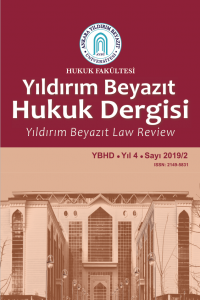Abstract
Çevrenin korunması ve
geliştirilmesini amaç edinen çevre hakkına ilk kez, 1972 tarihli Birleşmiş
Milletler Stockholm Konferansı sonrası ortaya konan Bildiride, insanın
kendisine onurlu ve iyi bir hayat sürmeye olanak veren nitelikli bir çevrede
yaşama hakkına sahip olduğunun öngörülmesi suretiyle yer verilmiştir. Dayanışma
hakları olarak da adlandırılan üçüncü kuşak haklar arasında yer alan çevre
hakkı, Türk Anayasasının 56. maddesinde ekonomik ve sosyal haklar başlığı
altında düzenlenmiştir. Anayasada 2010 yılında yapılan değişiklikle Anayasada
ve Avrupa İnsan Hakları Sözleşmesi’nde düzenlenen hakların ihlal edildiği
iddiasıyla Anayasa Mahkemesine bireysel başvuru yoluyla başvurulması mümkündür.
Her ne kadar çevre hakkı Avrupa İnsan Hakları Sözleşmesi’nde açıkça
düzenlenmemişse de, Avrupa İnsan Hakları Mahkemesi, içtihat yoluyla çevre
hakkını Sözleşme içerisinde düzenlenen diğer haklarla ilişkilendirerek çevrenin
korunmasını güvence altına almaktadır. Anayasa Mahkemesi de çevre hakkının
korunmasına yönelik önüne gelen başvuruları, sağlıklı bir çevrede yaşamayı
Anayasanın 17. maddesinde düzenlenen maddi ve manevi varlığın geliştirilmesi
hakkının bir parçası olarak değerlendirmek suretiyle incelemektedir.
References
- Aydın, Öykü Didem (2011) “Türk Anayasa Yargısında Yeni Bir Mekanizma: Anayasa Mahkemesine Bireysel Başvuru, Gazi Üniversitesi Hukuk Fakültesi Dergisi, S: 4, s. 121-170.
- Aygörmez Uğurlubay, Gülsün (2015) Çevreye Karşı Suçlar Türk ve Alman Hukukunda Güncel Sorunlar, Yetkin Yayınları.
- Duymaz, Erkan (2012) “Avrupa İnsan Hakları Mahkemesi’nin Çevrenin Korunmasına Katkısı”, İstanbul Üniversitesi Siyasal Bilgiler Fakültesi Dergisi, S: 47, s. 121-160.
- Ertaş, Şeref (2012) Çevre Hukuku ve Hayvan Hakları Hukuku, İleri Yayınevi.
- Gözler, Kemal (2018) Türk Anayasa Hukuku Dersleri, 22. Baskı, Bursa, Ekin Yayınevi.
- Göztepe, Ece (1998), Anayasa Şikâyeti, Ankara, Ankara Üniversitesi Hukuk Fakültesi Yayınları No: 530.
- Güneş, Ahmet (2009) “Alman Çevre Hukukunun Anayasal Çerçevesi”, Ankara Üniversitesi Hukuk Fakültesi Dergisi, C: 58, S: 4, s. 777-821.
- Güneş, Ahmet (2014) “Çevre Hakkının Bireysel Başvuruya Konu Edilebilirliği Üzerine”, TAAD, Yıl: 5, S: 16, s. 79-103.
- Harris, D.J/O’Boyle, M/Bates, E.P/Buckley, C.M (2013), Avrupa İnsan Hakları Sözleşmesi Hukuku, 1. Baskı, Avrupa Konseyi,
- Kaboğlu, İbrahim (1996) Çevre Hakkı, İmge Kitabevi Yayınları.
- Kaboğlu, İbrahim (2007) Anayasa Yargısı, 4. Baskı, Ankara, İmge Kitabevi Yayınları.
- Kapani, Münci (1993) Kamu Hürriyetleri, 7. Baskı, Ankara, Yetkin Yayınları.
- Kaplan, Mahmut (2018) İmar Kirliliğine Neden Olma Suçu, Ankara, Seçkin Yayınları.
- Leib Hajjar, Linda (2011) Human Rights and the Environment, Martinus Nijhoff Publishers.
- Memiş, Emin (2015) Çevre ve Çevre İdare Hukuku, Filiz Kitabevi. Mowbray, Alistar (2007) Cases and Materials on the European Convention on Human Rights, 2. Baskı, Oxford University Press, Özdek, Yasemin (1993) İnsan Hakkı Olarak Çevre Hakkı, Ankara, Türkiye ve Orta Doğu Amme İdaresi Enstitüsü Yayınları No: 249.
- Shelton, Dinah (1991) “The Right to Environment”: Eide, Asborn/Helgesen, Jan, The Future of Human Rights Protection in a Changing World, Oslo, Norwegian University Press.
- Şirin, Tolga (2013) Türkiye’de Anayasa Şikayeti (Bireysel Başvuru), İstanbul, Oniki Levha Yayınları.
- Tanör, Bülent/Yüzbaşıoğlu, Necmi (2018) 18. Baskı, İstanbul, Beta Yayınları.
- Turgut, Nükhet (2001) Çevre Hukuku, Ankara, Savaş Yayınevi.
- Yokuş Sevük, Handan (2017) Çevre Hukuku, 2. Baskı, Adalet Yayınevi.
- ÇALIŞMA İÇERİSİNDE GEÇEN MAHKEME KARARLARI Avrupa İnsan Hakları Mahkemesi Kararları
- Apanasewicz v. Polonya, Başvuru No: 6854/07, 03.05.2011.
- Dubetska ve Diğerleri v. Ukrayna, Başvuru No: 30499/03, 10.05.2011.
- Fadeyeva v. Rusya, Başvuru No: 55723/00, 09.06.2005.
- Fredin vs. İsveç, Başvuru No: 12033/86, 18.02.1991.
- Giocornelli v. İtalya, Başvuru No: 59909/00, 26.03.2007.
- Guerra ve Diğerleri v. İtalya, Başvuru No: 116/1996/735/932, 19.02.1998.
- Hatton ve Diğerleri v. Birleşik Krallık, Başvuru No: 36022/97, 08.07.2003.
- Koch v. Almanya, Başvuru No: 497/09, 19.7.2012.
- Krytatos v. Yunanistan, Başvuru No: 41666/98, 22.5.2003.
- Moreno Gomez v. İspanya, Başvuru No: 4143/02, 16.11.2004.
- Okyay ve Diğerleri v. Türkiye, Başvuru No: 36220/97, 12.07.2005.
- Öçkan ve Diğerleri v. Türkiye, Başvuru No: 46771/99, 28.03.2006.
- Öneryıldız v. Türkiye, Başvuru No: 48939/99, 30.11.2004.
- Powell ve Rayner v. Birleşik Krallık, Başvuru No: 9310/81, 21.02.1990.
- Tatar v. Romanya, Başvuru No: 67021/01, 06.07.2009.
- Taşkın ve Diğerleri v. Türkiye, Başvuru No: 46117/99, 10.11.2004.
- Zander v. İsveç, Başvuru No: 14282/88, 25.11.1993.
- Anayasa Mahkemesi Kararları
- Binali Özkaradeniz ve Diğerleri, Başvuru No: 2014/4686, 1.2.2018.
- D. Ö. Başvurusu, Başvuru No: 2014/3735, 12.06.2018.
- Hüseyin Tunç Karlık ve Zahide Şadan Karluk, Başvuru No: 2013/6587, 24.3.2016.
- Mehmet Bolat ve Diğerleri, Başvuru No: 2013/5974, 10.03.2016.
- Mehmet Kurt, Başvuru No: 013/2552, 25.02.2016.
Abstract
The right to environment, which aims to protect and improve the environment, was first mentioned in the Declaration issued after the United Nations Conference in Stockholm in 1972 by stipulating that a person has the right to live in a decent environment which allows him to live a dignified and good life. The right to environment, which is also referred to as the third generation rights, also called solidarity rights, is regulated under the heading of economic and social rights in the Article 56 of the Turkish Constitution. The amendment to the Turkish Constitution in 2010 made it possible for everyone to apply to the Constitutional Court by individual application on the grounds that one of the fundamental rights and freedoms within the scope of the European Convention on Human Rights which are guaranteed by the Constitution has been violated by public authorities. Although the right to the environment is not explicitly regulated in the European Convention on Human Rights, the European Court of Human Rights guarantees the protection of the environment by assessing the right to the environment with other rights regulated by the Convention. The Constitutional Court examines the applications for the protection of the right to environment by evaluating it as a part of the right to life and the right to protect and improve someone’s corporeal and spiritual existence regulated in Article 17 of the Constitution.
Keywords
Right to Environment Individual Application Constitutional Court European Convention on Human Rights Constitutional Environmental Protection
References
- Aydın, Öykü Didem (2011) “Türk Anayasa Yargısında Yeni Bir Mekanizma: Anayasa Mahkemesine Bireysel Başvuru, Gazi Üniversitesi Hukuk Fakültesi Dergisi, S: 4, s. 121-170.
- Aygörmez Uğurlubay, Gülsün (2015) Çevreye Karşı Suçlar Türk ve Alman Hukukunda Güncel Sorunlar, Yetkin Yayınları.
- Duymaz, Erkan (2012) “Avrupa İnsan Hakları Mahkemesi’nin Çevrenin Korunmasına Katkısı”, İstanbul Üniversitesi Siyasal Bilgiler Fakültesi Dergisi, S: 47, s. 121-160.
- Ertaş, Şeref (2012) Çevre Hukuku ve Hayvan Hakları Hukuku, İleri Yayınevi.
- Gözler, Kemal (2018) Türk Anayasa Hukuku Dersleri, 22. Baskı, Bursa, Ekin Yayınevi.
- Göztepe, Ece (1998), Anayasa Şikâyeti, Ankara, Ankara Üniversitesi Hukuk Fakültesi Yayınları No: 530.
- Güneş, Ahmet (2009) “Alman Çevre Hukukunun Anayasal Çerçevesi”, Ankara Üniversitesi Hukuk Fakültesi Dergisi, C: 58, S: 4, s. 777-821.
- Güneş, Ahmet (2014) “Çevre Hakkının Bireysel Başvuruya Konu Edilebilirliği Üzerine”, TAAD, Yıl: 5, S: 16, s. 79-103.
- Harris, D.J/O’Boyle, M/Bates, E.P/Buckley, C.M (2013), Avrupa İnsan Hakları Sözleşmesi Hukuku, 1. Baskı, Avrupa Konseyi,
- Kaboğlu, İbrahim (1996) Çevre Hakkı, İmge Kitabevi Yayınları.
- Kaboğlu, İbrahim (2007) Anayasa Yargısı, 4. Baskı, Ankara, İmge Kitabevi Yayınları.
- Kapani, Münci (1993) Kamu Hürriyetleri, 7. Baskı, Ankara, Yetkin Yayınları.
- Kaplan, Mahmut (2018) İmar Kirliliğine Neden Olma Suçu, Ankara, Seçkin Yayınları.
- Leib Hajjar, Linda (2011) Human Rights and the Environment, Martinus Nijhoff Publishers.
- Memiş, Emin (2015) Çevre ve Çevre İdare Hukuku, Filiz Kitabevi. Mowbray, Alistar (2007) Cases and Materials on the European Convention on Human Rights, 2. Baskı, Oxford University Press, Özdek, Yasemin (1993) İnsan Hakkı Olarak Çevre Hakkı, Ankara, Türkiye ve Orta Doğu Amme İdaresi Enstitüsü Yayınları No: 249.
- Shelton, Dinah (1991) “The Right to Environment”: Eide, Asborn/Helgesen, Jan, The Future of Human Rights Protection in a Changing World, Oslo, Norwegian University Press.
- Şirin, Tolga (2013) Türkiye’de Anayasa Şikayeti (Bireysel Başvuru), İstanbul, Oniki Levha Yayınları.
- Tanör, Bülent/Yüzbaşıoğlu, Necmi (2018) 18. Baskı, İstanbul, Beta Yayınları.
- Turgut, Nükhet (2001) Çevre Hukuku, Ankara, Savaş Yayınevi.
- Yokuş Sevük, Handan (2017) Çevre Hukuku, 2. Baskı, Adalet Yayınevi.
- ÇALIŞMA İÇERİSİNDE GEÇEN MAHKEME KARARLARI Avrupa İnsan Hakları Mahkemesi Kararları
- Apanasewicz v. Polonya, Başvuru No: 6854/07, 03.05.2011.
- Dubetska ve Diğerleri v. Ukrayna, Başvuru No: 30499/03, 10.05.2011.
- Fadeyeva v. Rusya, Başvuru No: 55723/00, 09.06.2005.
- Fredin vs. İsveç, Başvuru No: 12033/86, 18.02.1991.
- Giocornelli v. İtalya, Başvuru No: 59909/00, 26.03.2007.
- Guerra ve Diğerleri v. İtalya, Başvuru No: 116/1996/735/932, 19.02.1998.
- Hatton ve Diğerleri v. Birleşik Krallık, Başvuru No: 36022/97, 08.07.2003.
- Koch v. Almanya, Başvuru No: 497/09, 19.7.2012.
- Krytatos v. Yunanistan, Başvuru No: 41666/98, 22.5.2003.
- Moreno Gomez v. İspanya, Başvuru No: 4143/02, 16.11.2004.
- Okyay ve Diğerleri v. Türkiye, Başvuru No: 36220/97, 12.07.2005.
- Öçkan ve Diğerleri v. Türkiye, Başvuru No: 46771/99, 28.03.2006.
- Öneryıldız v. Türkiye, Başvuru No: 48939/99, 30.11.2004.
- Powell ve Rayner v. Birleşik Krallık, Başvuru No: 9310/81, 21.02.1990.
- Tatar v. Romanya, Başvuru No: 67021/01, 06.07.2009.
- Taşkın ve Diğerleri v. Türkiye, Başvuru No: 46117/99, 10.11.2004.
- Zander v. İsveç, Başvuru No: 14282/88, 25.11.1993.
- Anayasa Mahkemesi Kararları
- Binali Özkaradeniz ve Diğerleri, Başvuru No: 2014/4686, 1.2.2018.
- D. Ö. Başvurusu, Başvuru No: 2014/3735, 12.06.2018.
- Hüseyin Tunç Karlık ve Zahide Şadan Karluk, Başvuru No: 2013/6587, 24.3.2016.
- Mehmet Bolat ve Diğerleri, Başvuru No: 2013/5974, 10.03.2016.
- Mehmet Kurt, Başvuru No: 013/2552, 25.02.2016.
Details
| Primary Language | Turkish |
|---|---|
| Subjects | Law in Context |
| Journal Section | PUBLIC LAW |
| Authors | |
| Publication Date | July 31, 2019 |
| Published in Issue | Year 2019 Issue: 2 |
Cite
Cited By
ANAYASA MAHKEMESİNİN BİREYSEL BAŞVURU KARARLARINDA ÇEVRE HAKKINA YAKLAŞIMI
Selcuk Universitesi Hukuk Fakultesi Dergisi
https://doi.org/10.15337/suhfd.948597
ANAYASA MAHKEMESİNİN BİREYSEL BAŞVURU KARARLARINDA DİN VE VİCDAN HÜRRİYETİ
Ankara Sosyal Bilimler Üniversitesi Hukuk Fakültesi Dergisi
https://doi.org/10.47136/asbuhfd.1068167
Türk Hukukunda Kuşların Korunmasına Dair Ulusal ve Uluslararası Mevzuatın İncelenmesi
JENAS Journal of Environmental and Natural Studies
https://doi.org/10.53472/jenas.1283186



